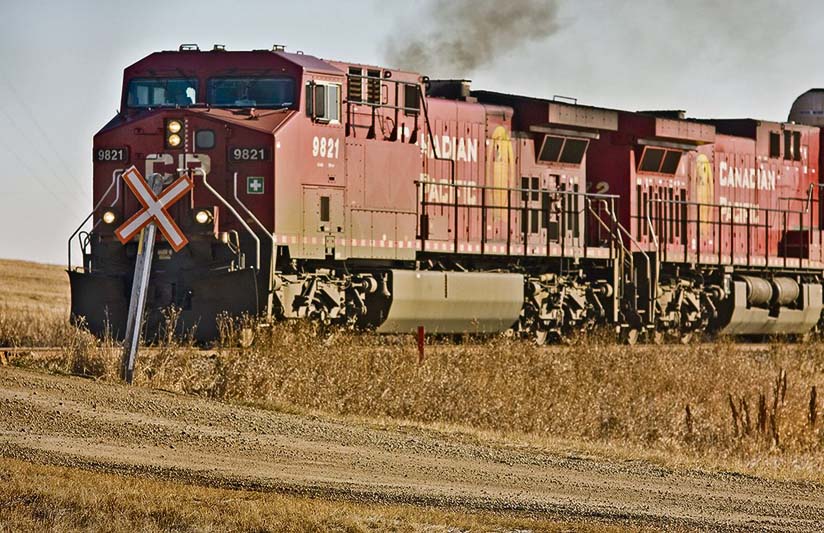

Canada - Farmers in all three prairie provinces are asking Ottawa to put the brakes on a federal deadline affecting private rail crossings
they rely on to access everything from fields to homes.
"We are sending a letter asking for an extension," said Lynn Jacobson, president of the Alberta Federation of Agriculture (AFA), adding the issue
likely isn't yet top of mind for most farmers.
"It's just going to slide in, and people wake up one day and say, oh my God, we should have paid attention," he said.
Hundreds of private crossings used by farmers on federally regulated rail lines could be affected by a deadline of 27 Nov 2021 to comply with federal safety
regulations that came into force in 2014, said Todd Lewis, president of the Agricultural Producers Association of Saskatchewan.
"In order to comply with the new regulations, producers and other rural landowners may face significant costs related to maintaining sight lines, widening
roads, and fulfilling other requirements," he said in a 22 Sep 2020 letter to Transport Minister Marc Garneau.
Lewis is also asking for a deadline extension, joining a similar request in a letter 25 Aug 2020 by Keystone Agricultural Producers (KAP) in
Manitoba.
Transport Canada is reviewing the deadline, said Frederica Dupuis, a senior adviser for media relations in the department.
"This review will need to be balanced, accounting for economic and safety considerations," she said in an e-mail 6 Oct 2020.
The new federal rules mark a major departure from how private crossings have been regulated since Western Canada was settled, said Bill Campbell, president of
KAP.
Farmers fear they may now potentially be held liable for accidents and derailments at private crossings, as well as paying for safety upgrades along with
ongoing maintenance and repairs, he said.
It is the AFA's understanding that "until now, grade crossings and maintenance have been the responsibility of the railways," said Jacobson in a
5 Oct 2020 letter to Garneau.
"AFA is concerned that without further engagement and clarity as to the actual costs of individual grade crossing upgrades, farmers may be greatly
burdened at a time when there are already many challenges thanks to COVID-19."
Campbell said he had heard of estimates for individual upgrades potentially costing as much as $90,000, with farmers having little say over what work is
undertaken because the upgrades would be solely conducted by railway companies.
"When you start seeing that impact, that's a significant amount of money to access your own property, so we've never had to deal with that type of
expenditure before," he said.
The approach of winter means the current construction season is coming to an end, adding to delays caused by the ongoing COVID-19 pandemic that are cutting
into the time left to meet the deadline, said Lewis.
Farmers need more time to get notification from railway companies, consider their options, and begin construction planning, he said.
"With the compliance deadline little more than a year away, we wonder how these upgrades can even be completed in a timely manner when the railways have
not yet provided farmers with private crossing assessments and costs," said Jacobson in his letter to Garneau.
The lack of clarity about such important details is due to inadequate consultation with farmers, said Campbell.
Just like farmers in Alberta and Saskatchewan, he said those in Manitoba only began learning about the existence of the regulations, and the compliance
deadline earlier this year after receiving letters from railway companies, six years after the regulations came into force, and approaching the final year
before the compliance deadline.
However, Dupuis said an "inclusive and extensive process was undertaken to develop the regulations," which included working groups and national
consultation meetings with representatives from the Canadian Federation of Agriculture, as well as municipalities, railway companies, and railway
unions.
Other measures included things such as a letter-writing campaign targeting 1,656 road authorities once the regulations came into force, she said.
Dupuis said Transport Canada has "consistently heard from the stakeholder community," including farmers, about the compliance deadline.
Campbell said such efforts fell short because the federal government didn't directly reach out at the grassroots level to farmers.
He advised members of the agricultural community to work together through farmer organizations and municipalities to try to resolve issues rather than simply
approaching railway companies or government agencies as individuals.
"I would suggest farmers are not alone in this," he said.
Doug Ferguson.
(because there was no image with original article)
(usually because it's been seen before)
provisions in Section 29 of the Canadian
Copyright Modernization Act.
